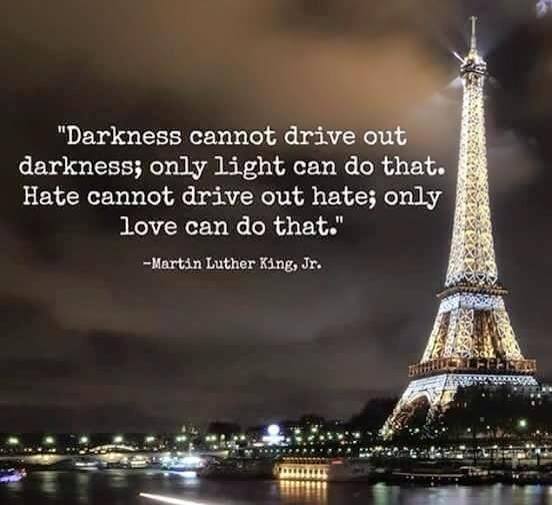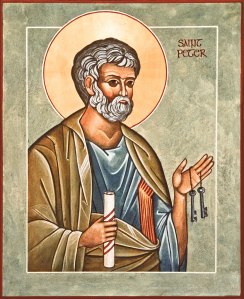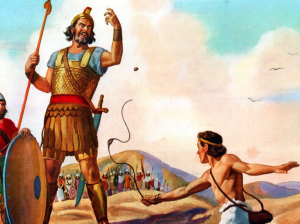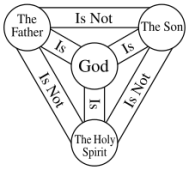This sermon was preached at the St. Andrew’s 8am & St. Peter’s 11am Holy Communion services on 15th November 2015. The readings were Daniel 12:1-3, Hebrews 10:11-25 and Mark 13:1-8.
Our readings today direct our thoughts to the time when Jesus will return in glory to this world, His world. It’s appropriate for us to look at this today for a few reasons – next week we celebrate Christ the King, then enter Advent as we prepare ourselves for the coming of the King of Kings born into the world as a poor, homeless peasant child; and today we cast our minds back to this time last year as we bid our dear Ian farewell as he went on ahead of us to wait with Jesus for the end times.
Alongside that we have the devastating attacks that have taken place in Paris this Friday, where at least 129 people were brutally murdered while doing nothing more than enjoying an evening out.
At times like these it’s not unusual for our thoughts to turn to the end times – not just our own time, but the end of everybody’s time. On most days this seems so far off as to be inconsequential – but at others it seems so real, the line between this world and the next so thin, that we can almost touch it.
For some this is a comforting thought, for some it is downright terrifying. For some it would depend on what day of the week you asked them.
All three of our readings have elements of Jewish apocalyptic writing – a style that usually anticipates a great crisis to befall the world, but in light of a current crisis afflicting the people it’s written for.
It looks to explain what’s happening in the material world by talking of what is happening in the parallel spiritual realm, with everything happening on earth representing and matching up to a larger, heavenly struggle between good and evil. So it reads into earthly events cosmic significance, and anticipates future events on earth in light of the coming battle between the forces of God and the devil.
This attempt to make sense of current events and experiences by casting them in a larger, cosmic framework should, theoretically bringing comfort or reassurance to people who find themselves suffering or being oppressed. The problem with this style of writing comes, however, when the words are taken out of context and applied to any given situation being faced in a person, or peoples, lives. This is one of the biggest mistakes we make with the Bible full stop – taking the words away from their original usage, meaning and intended audience & try to apply them with a large trowel to any situation we see fit.
This is not to say God does not speak to us through the Bible, that we won’t find passages that encourage, challenge, strengthen or comfort us, but to understand how they apply to us & what God wants us to take from them requires an understanding of why they were written in the first place. Otherwise it’s like taking the instructions for a washing machine & applying them to a tumble dryer – they’re both big white boxes with a window in the front, but they have different purposes despite their similarities.
And this is the point Jesus is making to His disciples in our Gospel reading today – not the thing about washing machines, obviously, but the warning not to try to lay specific words given for one situation over a different one, even if there are similarities.
To set the scene, chapter 12 of Mark’s Gospel has Jesus challenging the perceived authority of the religious elite at the temple.
Obviously Jesus is secure in the knowledge that God has supreme authority, but for his disciples to hear Him openly criticising the scribes and the Pharisees in public must have been a big indicator, a big wake up call, that their friend and teacher really was prepared to live and ultimately die to give glory to God the Father. With this in mind, I tend to hear the disciples acclamation about the wonderful stones and buildings in a tone of voice that says, “Teacher, have you seen this place. Are we seriously going to take this on?” In response to this, Jesus immediately plays down the perceived permanence of the Temple – after all, while the ancient holy place may have seemed immovable only God Himself is eternal, meaning everything else is temporary in comparison.
He then sits down with His closest companions and answers their very obvious follow-up question – when is this going to happen? To understand His answer again relies on knowing the context Mark was writing in. This Gospel is seen as the earliest of the four in the New Testament, probably written between AD 65-70, and is generally accepted to be the good news as recalled by Peter, which Mark wrote down. So, in light of the Roman-Jewish war of 66-70, which led to amongst other things the destruction of the Temple, this passage seems to be specifically addressing a given point in history.
Contrary to popular expectations in Jewish and Christian apocalyptic circles, war, catastrophe, persecution and the fall of Jerusalem and desecration of the Temple were not sure signs of the end of the world. Though these things had just occurred, ‘the end is not yet.’ The end of history is instead to be associated with the coming of the Son of Man in glory. From now on, for Christians, the return of Jesus replaces the Temple as the focal point of hope for the full realization of the Kingdom of God. The intention of the text is therefore to call the followers of Jesus – those sitting on the Mount of Olives, those reading the Gospel as the Temple was destroyed, and us sitting here today – to hope for the coming of the Christ the Lord.
You see, our situation today is similar to that of the first readers in at least one important respect: The historical signs which many people associate with the end of the world have occurred countless times by now, but the final coming of the Son of Man still lies in the future.
We should call Mark 13 to mind whenever we see news articles, hear broadcasts or even come across people or preachers brandishing calculations that conclude, “This is the time!…” When we read about the Paris attacks, when we see the news footage, it’s easy to believe the world is broken and it’s time to scrap it and start again. But this is where our historical situation is quite different from that of the first readers. The cosmos did not collapse, nor did the Son of Man come in clouds with great power during the lifetime of the Twelve, or during any of horrific events of the past, meaning our Gospel passage offers us a balance. It both gently corrects and reigns in apocalyptic enthusiasm on one hand, while challenging jaded scepticism on the other.
But more than that, this passage also reminds us that, in reality, Jesus will return. Maybe the trumpet is set to sound in about 6 billion years, when scientists predict the Sun’s core will run out of hydrogen, leading it to collapse then grow in size, consuming the orbits of Mercury, Venus and eventually the Earth as well. Or maybe the world will end tomorrow, or the next day – “No one knows when that day and hour will come” as Jesus reminds us in Matthew’s Gospel. So there is never a better time to seek to repair, restore, or even begin a relationship with Jesus – than right now.
This understanding of the need to watch, expectantly, for the return of Christ should help us realize that we really do need to be mindful of God’s presence in our own lives, and allow Him to act through them.
It may be that some of us here need to start believing, really believing, that actually Jesus really does love you; that He really did die for you and would have done even if you were the only person to ever have existed.
Some of us may need to realise that our sins can, and have, been forgiven.
Some of us may need to reach the conclusion that there will never be the ‘right’ time to have the conversation about faith with our friend, loved one or work colleague that we keep putting off, despite the Holy Spirit tugging at our sleeve like a toddler wanting a biscuit every time we see them.
But all of us need to realise that whatever we are facing at the moment, whatever trials or triumphs, pains or pleasures fill our waking and our sleeping, Jesus is right there with us through them, and is preparing us each day for the journey home to be with Him.
Friday’s atrocities may seem like the beginning of the end – in the apocalyptic narrative they serve as a reminder of the fragility of our earthly existence. But the Good News of Jesus Christ should remind us – should convict us – that no matter what happens in this world, the cosmic battle between good and evil has already been won. Death has been destroyed by the resurrection, so we can stand with confidence and proclaim that these terrorists, committing acts of evil while hiding behind a false interpretation of the Islamic faith, may at worst destroy our mortal bodies, but can never take our eternal soul.
The writer to the Hebrews captured this perfectly in our reading today.
“We have a great priest in charge of the house of God. So let us come near to God with a sincere heart and a sure faith, with hearts that have been purified from a guilty conscience and with bodies washed with clean water. Let us hold on firmly to the hope we profess, because we can trust God to keep his promise. Let us be concerned for one another, to help one another to show love and to do good. Let us not give up the habit of meeting together, as some are doing. Instead, let us encourage one another all the more, since you see that the Day of the Lord is coming nearer.”
Our hope is founded on the glorious reality that Jesus lived, died and rose again to set us free from sin and death.
We can confidently welcome the stranger, stand firm with the oppressed and marginalised, whatever their background or beliefs, and all because our hope does not rely on mortal men but on the grace and power of the eternal God.
An easy way “to help one another to show love and to do good” is by example, by the way we talk about those who are fleeing the very terrorists who are claiming responsibility for the Paris attacks, or by how we relate to those in our communities who, over the next few weeks, will find their lives made even more difficult purely because their faith has been hijacked, twisted and defamed by people looking for an excuse to kill and destroy.
As Martin Luther King Jr once said:
“Darkness cannot drive out darkness; only light can do that. Hate cannot drive out hate; only love can do that.”
Our job, especially as we approach the reflective season of Advent, is to listen to Him, help those around us to do the same, and shine His light of love into the darkness of our world as we continually watch for His return in glory.
Amen.










